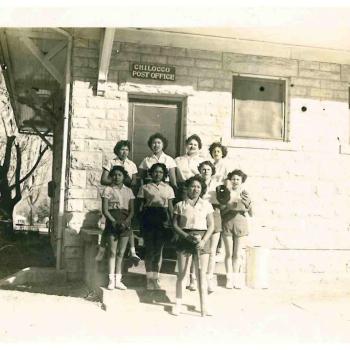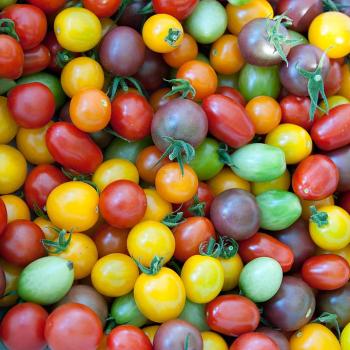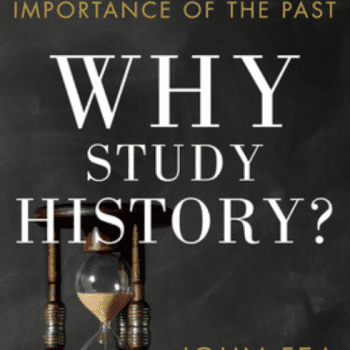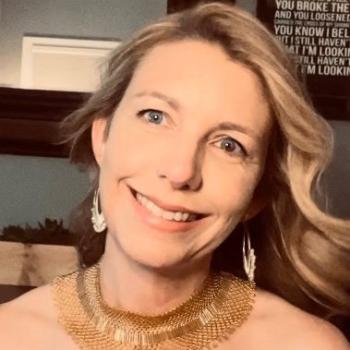I didn’t expect to write two posts on my first day on the job at The Anxious Bench. But then I didn’t expect to join this blog in the immediate aftermath of the worst mass shooting in American history, one that took the lives of forty-nine people at a gay nightclub in Orlando. Yet it feels like at least one of us should start to take on the challenge of making meaning of this very recent history.
I do have some training in military and international history, but this post will not be about terrorism or ISIS. I have personal opinions on gun control, but that’s not what I want to write about either. No, mostly what I’ve been thinking about — unable to stop thinking about, really — is what it means for me, as a Christian and a historian, to love the LGBT community as it grieves this tragedy.
Having had to eulogize two close friends in recent months has made me more conscious of the place of mourning in the historian’s vocation. “To study mortals,” I wrote this spring, “is to study incomplete lives. So history is full of beginnings without endings: unfinished projects, unrealized aspirations, deeds undone and words unsaid. Every story we tell has been cut short.” I concluded that historians should “weep with those who weep” (Rom 12:15), that they should “help communities… to grieve what’s incomplete and to lament what went awry….”
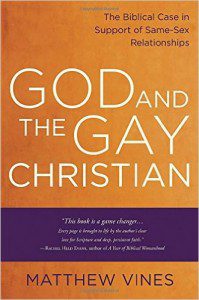 But I also want to take seriously the challenge posed by gay Christian activist Matthew Vines. First, that when Christians mourn what happened in Orlando, they “not erase the fact that the shooter targeted people for death because they were lesbian, gay, bisexual, and transgender.”
But I also want to take seriously the challenge posed by gay Christian activist Matthew Vines. First, that when Christians mourn what happened in Orlando, they “not erase the fact that the shooter targeted people for death because they were lesbian, gay, bisexual, and transgender.”
But even more crucially, Vines urged Christian readers of Time to “avoid qualifying your lament in any way….
This is not an acceptable time to mention your opposition to marriage equality.
What we need to hear is this: God loves lesbian, gay, bisexual and transgender people unconditionally. You love us and are committed to making the church the sanctuary it always should have been for us. Sadly, I have never heard a pastor who opposes same-sex marriage give a sermon declaring God’s love for LGBT people without including caveats about his or her opposition to same-sex relationships.
If there were ever a time to give that sermon—and to give it with genuine humility, compassion and an openness to learn and grow—now is the time. Churches will be marked in the LGBT community for years to come by how they respond to us in this moment. Please do all you can to let that mark be one of unconditional love.
I think he’s right. Churches — and perhaps Christian college professors blogging for an evangelical channel — have a chance to do for the LGBT community what we’ve failed for too long to do: to make our faith active, not in precision of theological or political argument, but in unconditional love of neighbors overcome by grief, fear, and anger.
Like so much else that comes with following the God of the Incarnation, we can’t just work out what such love means in the abstract. It must be particular, shaped by our calling, our gifts, and our location.
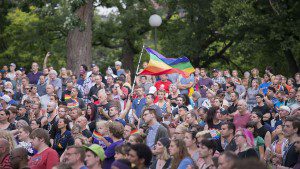
So how can I love my LGBT neighbors? I’m not a preacher with a pulpit; I can’t preach the sermon Vines longs to hear.
I’m a historian with a blog.
What I can do is what Christian historians should always strive to do: to love neighbors from the past, perhaps even in such a way that helps us love well in the present.
I can do my bit (a very little bit) to help my readers and students learn the history of LGBT Americans, a history that I daresay is largely unknown to most outside that community. I can encourage fellow citizens to weave into their national narrative the stories of a minority whose members long experienced community only in secret, in the relative safety of places like nightclubs. And I can do the same with my fellow believers, whose story of the church may not yet include the experiences of queer Christians who have worshipped, prayed, rejoiced, mourned, and served with their straight brethren.
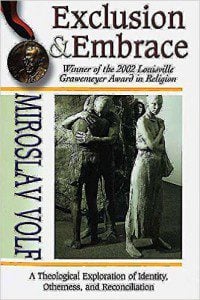
Why is this an act of love? First, to study any people’s history is to affirm in a practical, meaningful way that they bear the image of the God who made and loves them. It is a way to know our neighbors more like their Creator knows them. That is, in the words of Miroslav Volf, we learn to see “each human being concretely… [noting] not only their common humanity, but also their specific histories, their particular psychological, social, and embodied selves with their specific needs.”
While Volf rightly emphasizes that God sees “the powerful no less than the powerless,” those who follow Jesus Christ must particularly be willing to follow him into societies’ margins, loving those who have known the least love. Within history, this might mean that we should listen hardest for the voices most likely to be silenced, that we should pay special attention to the memories most susceptible to forgetting, and that we ought to empathize with those whose lives are easiest for us to ignore.
By doing so, we also fulfill Jesus’s hope that we will welcome the stranger (Mt 25:35), if only into our minds. As I reflected in one of those eulogies mentioned above, to say “it is well that you have come” is a healing, reconciling act:
It is well: what was sick is being made healthy; persons who were broken are being made whole.
For what else is the Fall but this: created for relationship, we were made strangers — to our Creator and to each other? By sin, we see God and everyone made in his image with fear and suspicion rather than awe and wonder.
But by grace, we replace estrangement with reconciliation. What else is our mission but this?
Because Christ “died for all, that those who live should no longer live for themselves,” the Apostle Paul admonishes that we ought to “regard no one from a worldly point of view.” We ought to regard no one — not black or white, male or female, Christian or Muslim, native-born or immigrant, Democrat or Republican: no one — as the strangers that the world sees.
Now, I do all these things imperfectly, no matter who I study. (Start with the fact that when I first shared this eulogy, I neglected to include “gay or straight” in the list above.) And as is often true of my blogging, the most important audience for this post is probably its author: a historian whose training, teaching, and research has too rarely featured LGBT history.
But one of the joys of blogging is that I can write out of curiosity and conviction, if not expertise, and use my training to help curate resources that we can study together. For starters, we might read some of the following sources (as we would any source: critically, but empathetically, desiring to better understand the human experience):
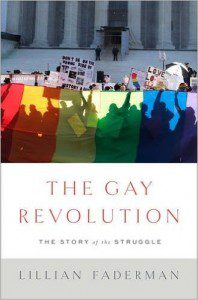 • PBS’s American Experience series is often a good place to start, perhaps in this case with the 2011 documentary on the Stonewall Uprising.
• PBS’s American Experience series is often a good place to start, perhaps in this case with the 2011 documentary on the Stonewall Uprising.
• But the LGBT history of this country did not begin in 1969, and it took many twists and turns after Stonewall. Fortunately, several recent histories tell a much fuller story in an accessible manner. Lillian Faderman’s The Story of the Struggle made multiple “best of 2015” lists, with the Washington Post calling it “compulsively readable, carefully anchored in the historical record, overflowing with riveting stories and thoughtful analysis.”
• Even more recent, and even more committed to telling a broader story of homosexuality in America, is Jim Downs’ Stand by Me, particularly notable for paying attention to gay faith communities like the Metropolitan Community Church.
• If you want more specific histories… My colleague AnneMarie Kooistra, who teaches our department’s course on the history of sexuality in America, recommends books by George Chauncey, Allan Berube, Martin Duberman, and Elizabeth Lapovsky Kennedy & Madeline Davis. (She also suggested the reading list for Out of the Past, an older PBS documentary.)
• You could tackle one of the winners of the John Boswell Prize — named for the Yale historian whose pioneering (albeit still controversial) research on Christianity and homosexuality was cut short by his death from AIDS in 1994.
• For more on this topic, Diarmaid MacCulloch’s experience as a gay man in the Church of England (he now calls himself a “candid friend of Christianity”) informs his work as a church historian, as he explains in the introduction to his newest book, Silence: A Christian History. (One such silence receiving extended attention is that of homosexual men in the Anglo-Catholic movement. See also ch. 15 in his Reformation history that I mentioned this morning.)
It’s no doubt evident that I’m out of my depth here. Whether from fellow Bench-ers or readers, I’d welcome more suggestions in the comments section — for my own edification, if nothing else.
But I do urge you to join me in learning the history of LGBT Americans — in the hope that by learning to love our neighbors in the past, we might love them better in the present as well.




